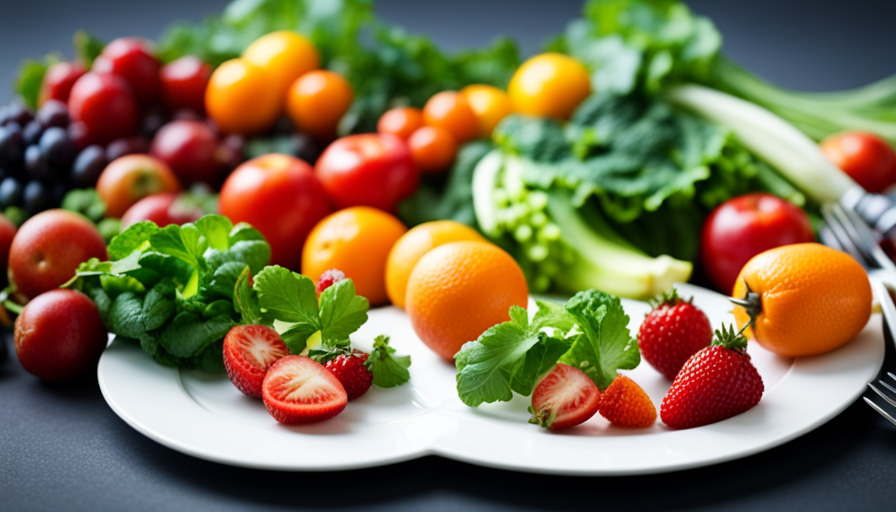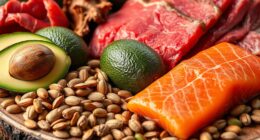When I first started following a raw food diet, I was excited to see the promised advantages of detoxification. It felt like doing a spring clean in my body, getting rid of toxins and creating a renewed, revitalized feeling.
But as I delved deeper into the world of raw food, I realized that the process of detoxification is not a one-size-fits-all journey. It varies from person to person, influenced by factors such as overall health, lifestyle, and individual metabolism. Just like a cluttered home, our bodies accumulate toxins over time, affecting our energy levels, digestion, and overall well-being.
But how long will it take for our bodies to detox on a raw food diet? In this article, we will explore the various factors that influence detoxification, the short-term, medium-term, and long-term effects of a raw food diet, and provide tips for a successful raw food detox.
So let’s roll up our sleeves and embark on this transformative journey together.
Key Takeaways
- The duration of detoxification on a raw food diet varies from person to person, ranging from a few weeks to several months.
- Successful detox on a raw food diet requires listening to your body’s needs and practicing intuitive eating.
- Seeking professional guidance from a nutritionist or dietitian is important when starting a raw food diet and detox process.
- Monitoring health markers during the detox process is essential to assess the body’s response and make necessary adjustments.
Understanding the Raw Food Diet
The raw food diet is a great way to cleanse your body and improve your overall health. It involves consuming primarily uncooked and unprocessed foods, such as fruits, vegetables, nuts, and seeds. This diet is based on the belief that cooking food destroys its natural enzymes and nutrients, which are essential for optimal health.
However, it’s important to note that individual preferences and nutritional deficiencies can impact the effectiveness of this diet. Some people may find it challenging to stick to a raw food diet due to personal preferences and taste preferences. It can be difficult to give up cooked foods, especially if they’ve been a staple in your diet for a long time.
Additionally, it’s important to ensure that you’re getting all the necessary nutrients from a raw food diet. Without proper planning, it’s possible to develop nutritional deficiencies, such as a lack of protein, iron, and vitamin B12.
Factors influencing detoxification, such as individual metabolism and overall health, play a significant role in how long it takes for the body to detox on a raw food diet.
Factors Influencing Detoxification
When it comes to detoxification on a raw food diet, there are a few factors that can influence the process. Firstly, individual metabolism and overall health play a significant role in how quickly the body eliminates toxins. Additionally, the duration and consistency of the raw food diet can also impact the effectiveness of detoxification.
It’s important to consider these factors when embarking on a raw food diet for detoxification purposes.
Individual metabolism and health
Although everyone’s metabolism and health are unique, it’s important to consider how long it may take for one’s body to detox on a raw food diet.
Individual metabolism plays a significant role in the detoxification process. Metabolism refers to the chemical processes that occur within the body to convert food into energy. Some individuals may have a faster metabolism, allowing their bodies to eliminate toxins more efficiently. On the other hand, individuals with slower metabolism may take longer to detoxify.
Additionally, an individual’s overall health status can impact the detoxification process. Factors such as underlying health conditions or a weakened immune system may affect how quickly the body eliminates toxins.
Understanding these individual differences can help individuals make informed decisions about the duration and consistency of the raw food diet, which will be discussed further in the next section.
Duration and consistency of the raw food diet
Embarking on a journey of raw nourishment, one can savor the bountiful fruits of vitality and transformation. However, the duration and consistency of the raw food diet can present challenges for some individuals.
Consistency is key when it comes to reaping the full benefits of a raw food diet, as it takes time for the body to adjust and detoxify. Some people may experience a detox plateau, where the body seems to stop eliminating toxins and the desired effects may diminish. This can occur due to a variety of factors, such as an inadequate variety of raw foods or a lack of proper hydration.
It’s important to stay committed and maintain a diverse and well-balanced raw food diet to overcome these challenges and continue experiencing the positive changes. Transitioning into the subsequent section about the short-term effects of a raw food diet, it’s crucial to understand the impact it can have on our bodies.
Short-Term Effects of a Raw Food Diet
The initial transition to a raw food diet can bring about a range of short-term effects on the body. Some individuals may experience detox symptoms as their body adjusts to the new way of eating. These symptoms can include headaches, fatigue, irritability, and cravings. It is important to note that these symptoms are temporary and should subside as the body eliminates toxins.
Additionally, a raw food diet may lead to nutritional deficiencies if not properly planned. Since this diet eliminates certain food groups like meat and dairy, it is crucial to ensure adequate intake of essential nutrients such as protein, iron, calcium, and vitamin B12. Incorporating a variety of fruits, vegetables, nuts, seeds, and sprouted grains can help meet these nutrient needs.
To illustrate the potential short-term effects of a raw food diet, here is a table highlighting common detox symptoms and possible nutritional deficiencies:
| Detox Symptoms | Nutritional Deficiencies |
|---|---|
| Headaches | Iron, Vitamin B12 |
| Fatigue | Protein, Iron |
| Irritability | Calcium, Vitamin B12 |
| Cravings | Protein, Vitamin B12 |
As the body adjusts to a raw food diet and detoxes from previous eating habits, it is essential to be mindful of any short-term effects and address potential nutritional deficiencies. These considerations will be further explored in the subsequent section on the medium-term effects of a raw food diet.
Medium-Term Effects of a Raw Food Diet
During this phase, as your body embraces a raw food lifestyle, it’s like a vibrant garden blooming with renewed energy and nourishment.
The medium-term effects of a raw food diet can be quite significant, especially when it comes to weight loss. Many people experience a gradual and steady decrease in weight as they consume a predominantly raw food diet. This is because raw foods are generally lower in calories compared to processed or cooked foods. Additionally, the high fiber content in raw fruits and vegetables can help promote feelings of fullness and reduce overall calorie intake.
However, it’s important to note that a raw food diet may also lead to potential nutrient deficiencies. Without careful planning and a variety of food choices, it can be challenging to obtain all the necessary nutrients, such as vitamin B12, iron, and calcium. Some individuals may need to consider supplementation or consult with a healthcare professional to ensure they are meeting their nutritional needs adequately.
As we transition to discussing the long-term effects of a raw food diet, it’s important to consider the potential benefits and limitations of this lifestyle choice.
Long-Term Effects of a Raw Food Diet
In the long-term, a raw food diet can have several positive effects on our health. One key benefit is the enhanced function of our immune system. By consuming a diet rich in fruits, vegetables, and raw nuts and seeds, we provide our bodies with essential nutrients that support the immune system’s ability to fight off infections and diseases.
Additionally, a raw food diet has been linked to a reduced risk of chronic diseases such as heart disease, type 2 diabetes, and certain types of cancer. This is due to the high intake of antioxidants, fiber, and phytochemicals found in raw plant-based foods, which have been shown to promote overall health and prevent the development of chronic conditions.
Enhanced immune system function
Boost your immune system function by switching to a raw food diet – you’ll notice the difference in no time!
Raw foods are packed with essential nutrients, enzymes, and antioxidants that support and boost immunity. By consuming a variety of fruits, vegetables, nuts, and seeds in their natural state, you provide your body with the necessary vitamins and minerals to enhance immune system function.
Studies have shown that a raw food diet can increase the production of immune cells, strengthen the body’s defense mechanisms, and reduce inflammation. Additionally, the high fiber content in raw foods helps maintain a healthy gut, which plays a crucial role in immune system support.
By adopting a raw food diet, you can reduce your risk of chronic diseases and improve your overall health.
Reduced risk of chronic diseases
After discussing the benefits of an enhanced immune system function on a raw food diet, it’s important to highlight the reduced risk of chronic diseases that this diet offers.
Studies have shown that a raw food diet can significantly reduce inflammation in the body, which is a major contributor to chronic diseases such as heart disease, diabetes, and certain types of cancer.
Additionally, the high fiber content in raw fruits and vegetables improves digestion and helps maintain a healthy gut microbiome, which is essential for overall well-being.
A raw food diet not only enhances immune system function but also reduces the risk of chronic diseases through reduced inflammation and improved digestion. These benefits make a raw food diet an appealing option for those looking to improve their long-term health.
Now let’s explore how long it takes for the body to detoxify on a raw food diet.
Timeline for Detoxification on a Raw Food Diet
During your journey on a raw food diet, your body will embark on a detoxification process that can be compared to a caterpillar transforming into a beautiful butterfly. The timeline for detoxification on a raw food diet varies from person to person and depends on several factors.
These factors include the individual’s previous diet, lifestyle habits, overall health, and the level of toxins accumulated in the body.
Some people may experience immediate detoxification symptoms, such as headaches, fatigue, or digestive issues, within the first few days or weeks of starting a raw food diet. This is because the body is eliminating toxins and adjusting to the new diet. These symptoms are usually temporary and a sign that the detoxification process is taking place.
The duration of the detoxification process can range from a few weeks to several months. It is important to note that detoxification is a gradual and ongoing process. As you continue on your raw food journey, your body will continue to eliminate toxins and become more efficient at detoxifying itself.
The timeline for detoxification on a raw food diet varies and depends on individual factors. It is a gradual process that can take weeks to months. Transitioning to a raw food diet requires patience and perseverance.
In the next section, we will discuss some tips for a successful raw food detox, including ways to support your body during this process.
Tips for a Successful Raw Food Detox
To ensure a successful raw food detox, it’s crucial to implement these helpful tips. First and foremost, it’s important to have a variety of raw food detox recipes on hand. This will keep your meals interesting and help you stick to the program.
There are plenty of delicious and nutritious recipes available online, ranging from simple salads to more complex dishes like raw vegan lasagna.
During a raw food detox, it’s common to experience some detox symptoms. These can include headaches, fatigue, and digestive issues. It’s important to remember that these symptoms are temporary and a sign that your body is cleansing itself. Drinking plenty of water, getting enough rest, and practicing stress-reducing techniques like meditation can help alleviate these symptoms.
Listening to your body’s needs is key during a raw food detox. Pay attention to how you feel after eating certain foods and adjust your diet accordingly. If you notice that certain foods make you feel bloated or sluggish, try eliminating them from your diet for a while and see if you feel better. Remember, everyone’s body is different, so it’s important to listen to what yours is telling you.
Transitioning into the next section about ‘listening to your body’s needs,’ it’s important to remember that the key to a successful raw food detox is being in tune with your body and making adjustments as needed.
Listening to Your Body’s Needs
Transitioning from the previous subtopic of "Tips for a Successful Raw Food Detox," let’s now delve into the importance of listening to your body’s needs when embarking on a raw food diet. Intuitive eating is key to ensuring a successful and sustainable detoxification process.
When following a raw food diet, your body may undergo various changes as it adjusts to the new way of eating. It is crucial to pay attention to your body’s signals and respond accordingly. This means being mindful of hunger cues, cravings, and energy levels. Listening to your body’s needs allows you to provide it with the nutrients it requires and avoid potential deficiencies.
To help you better understand this concept, let’s explore a 3-column, 5-row table that demonstrates the connection between your body’s needs and intuitive eating:
| Body’s Need | Intuitive Eating |
|---|---|
| Hunger | Eating when hungry, stopping when full |
| Cravings | Identifying the underlying cause and finding healthy alternatives |
| Energy | Resting when tired, engaging in physical activity when energized |
By practicing intuitive eating and responding to your body’s needs, you can maintain a balanced approach to your raw food detox journey. This mindful approach will enable you to establish a sustainable relationship with food, leading to long-term health benefits.
Now that we understand the importance of listening to our body’s needs, the next step is seeking professional guidance to ensure a safe and effective raw food detox.
Seeking Professional Guidance
When embarking on a raw food diet and detox process, it’s important to seek professional guidance from a nutritionist or dietitian. These experts can provide personalized advice and ensure that you’re meeting your nutritional needs while detoxing.
Additionally, they can monitor health markers such as blood pressure, blood sugar levels, and nutrient levels to ensure that the detox process is safe and effective.
Consulting with a nutritionist or dietitian
Considering consulting with a nutritionist or dietitian who can provide personalized guidance and support may be the key to successfully navigating a raw food diet and understanding how long it will take for your body to detox. This consultation offers various benefits such as receiving personalized recommendations based on your specific health needs and goals.
A nutritionist or dietitian can assess your current diet, lifestyle, and medical history to create a tailored plan that ensures you’re getting all the necessary nutrients while on a raw food diet. They can also provide guidance on how to gradually transition into a raw food diet to minimize discomfort and potential nutrient deficiencies.
Additionally, a nutritionist or dietitian can monitor your progress and make adjustments as needed, helping you stay on track and achieve optimal health. By consulting with a professional, you can have peace of mind knowing that you’re taking the right steps towards a successful detox.
Transitioning into the subsequent section, monitoring health markers during the detox process is essential to ensure your body is responding well to the changes.
Monitoring health markers during the detox process
After consulting with a nutritionist or dietitian, it’s important to monitor your health markers during the detox process. Tracking your progress allows you to see how your body is responding to the raw food diet and whether any adjustments need to be made.
It’s normal to experience detox symptoms such as headaches, fatigue, and digestive issues as your body eliminates toxins. However, it’s crucial to pay attention to any severe or prolonged symptoms, as they may indicate a need for medical intervention.
Additionally, monitoring health markers like weight, blood pressure, and blood sugar levels can provide valuable insight into the impact of the raw food diet on your overall health. By regularly assessing these markers, you can ensure that your detox process is safe and effective.
Moving forward, we will explore how to maintain a balanced and sustainable lifestyle on a raw food diet.
Maintaining a Balanced and Sustainable Lifestyle
Incorporating cooked foods in moderation is an important aspect of maintaining a balanced and sustainable lifestyle. While a raw food diet can offer numerous health benefits, it’s also important to listen to our bodies and allow for flexibility in our eating habits.
Long-term strategies for maintaining detox benefits include focusing on whole, nutrient-dense foods, staying hydrated, and practicing mindful eating.
Incorporating cooked foods in moderation
While it’s totally okay to enjoy some cooked foods in moderation, it’s important to keep in mind that the primary focus of a raw food diet is on consuming uncooked, plant-based foods. However, incorporating cooked foods in moderation can provide some cooked food alternatives for those who are transitioning to a raw food diet. It’s important to choose healthier cooking methods, such as steaming or lightly sautéing, to retain more nutrients.
Here’s a table that compares raw and cooked versions of common foods:
| Raw Food | Cooked Alternative |
|---|---|
| Raw vegetables | Steamed vegetables |
| Fresh fruits | Baked fruits |
| Raw nuts | Roasted nuts |
By incorporating cooked foods in moderation, individuals can still enjoy some variety in their diet while reaping the benefits of raw food. This balanced approach allows for a smoother transition to a raw food diet.
Moving forward, let’s explore long-term strategies for maintaining detox benefits without compromising the body’s health.
Long-term strategies for maintaining detox benefits
To maintain the benefits of detox, you can adopt sustainable practices that support your overall well-being. When it comes to long-term strategies for maintaining detox benefits, consistency is key.
It’s important to continue incorporating raw foods into your diet and gradually reduce your intake of cooked foods. This allows your body to continue detoxifying and reap the benefits of a raw food diet.
Additionally, staying hydrated is crucial for flushing out toxins and supporting your body’s natural detoxification processes. Regular exercise can also help maintain detox benefits by increasing circulation and promoting the elimination of toxins through sweat.
Lastly, managing stress through practices such as meditation or yoga can support your body’s detoxification efforts. By implementing these long-term strategies, you can continue to experience the benefits of detox and support your overall well-being.
Frequently Asked Questions
Can I still consume cooked food while on a raw food detox?
Yes, you can still consume cooked food while on a raw food detox. However, it’s recommended to focus on incorporating more raw food alternatives into your diet. This can include raw fruits, vegetables, nuts, and seeds. Gradually reducing the consumption of cooked foods and increasing the intake of raw foods can help with transitioning to a raw food diet. It’s important to listen to your body and make changes at a pace that feels comfortable for you.
Will a raw food diet help with weight loss?
A raw food diet can potentially aid in weight loss. This type of diet typically consists of unprocessed, plant-based foods that are rich in nutrients and low in calories. By consuming raw foods, the body is provided with essential vitamins, minerals, and fiber, while also reducing calorie intake.
Additionally, some studies suggest that a raw food diet may boost metabolism and increase energy levels, which can further support weight loss efforts.
What are the potential side effects or symptoms during the detoxification process?
During the detoxification process, there are potential risks and symptoms that one may experience. These can include headaches, fatigue, irritability, and digestive issues. It’s important to note that everyone’s experience may vary.
To manage these detox symptoms, it is recommended to stay well-hydrated, get plenty of rest, and gradually transition into a raw food diet to minimize the intensity of detoxification. Consulting with a healthcare professional can also provide guidance and support throughout this process.
Can a raw food diet help improve digestion and gut health?
A raw food diet can indeed help improve digestion and gut health. By consuming raw fruits, vegetables, and nuts, you provide your body with essential nutrients and enzymes that aid in digestion. This can lead to better nutrient absorption and reduced inflammation in the gut.
Additionally, the high fiber content in raw foods promotes regular bowel movements, which is crucial for a healthy digestive system.
Is it necessary to take supplements or additional vitamins while on a raw food detox?
It is generally recommended to consult with a healthcare professional or registered dietitian before starting any detox or diet plan. While a raw food diet can provide many essential nutrients, it may be necessary to take supplements or additional vitamins depending on individual needs.
Factors such as age, gender, health conditions, and lifestyle choices can affect the necessity of supplementation. A healthcare professional can assess these factors and provide personalized recommendations for optimal health on a raw food detox.
Will Following a Raw Whole Food Vegan Diet Help with Body Detoxification?
Following a raw whole food vegan weight loss diet can help with body detoxification. Raw whole foods are rich in nutrients and enzymes, which can support the body’s natural detoxification processes. Additionally, a vegan diet can help eliminate processed and unhealthy foods that can burden the body’s detoxification systems.
Conclusion
In conclusion, embarking on a raw food diet can have various effects on your body’s detoxification process. It’s important to understand that the length of time it takes for your body to detox on this diet can vary depending on factors such as your current health status and lifestyle choices.
However, by listening to your body’s needs, seeking professional guidance, and maintaining a balanced and sustainable lifestyle, you can optimize the detoxification process. Remember, like a river flowing steadily, your body will cleanse and rejuvenate, embracing the power of raw, nutrient-rich foods.










